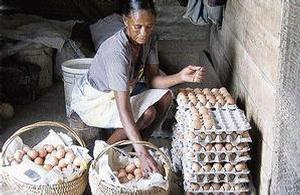
In this photo taken March 6, farmer Julie Anderson of the 1700 acre Negril Spot Valley Farm packs eggs for delivery to the Negril Tree House hotel. Egg farmers supply about 20 per cent of total output to hotels, representing about 2.5 million dozen table eggs per year. -
Photo by Janet Silvera
A new egg-processing plant built at a cost of $30 million will begin operation mid-December under partnership between Jamaica's poultry sector and a local distributor looking to claim the market for liquefied eggs, which is currently import driven.
The plant, Caribbean Egg Processors (CEP), is a joint venture formed by a newly incorporated company called Liquid Eggs Limited (LEL) and the Montego Bay-based Caribbean Producers Limited.
Liquid Eggs, whose major shareholders include members of the Jamaica Egg Farmers Association and other unnamed stakeholders, has a 70 per cent stake in CEP, while Caribbean Producers owns the other 30 per cent, according to Norman Williams, general manager of Jamaica Egg Services Limited (JES), in written responses Wednesday to Financial Gleaner queries.
The new plant has the capacity to liquefy up to 18,000 eggs per hour, but will begin operation at 10,000 eggs per hour or 56 per cent capacity.
That level of production, says Williams, is enough to make the plant viable.
"The excess capacity was considered prudent with respect to projected further growth in the target market and the possibility of export to other islands in CARICOM," said the JES manager whose company is a full subsidiary of the McCooks Pen, St Catherine-based Jamaica Broilers Group. "At the current production of 56 per cent of rated capacity the business is viable."
The plant is to be the Caribbean's first egg processing facility, and is meant to tap the hotel market where there is high and an estimated growing demand for liquid eggs.
That demand is currently filled with imports.
Investment
But, the farmers also made the liquid egg investment in a move to stave off what they perceive as a pending shift in demand.
Jamaican poultry farmers now sell 20 per cent of their table egg stock to the hospitality sector, Williams said at a St. Catherine gathering of regional producers this month, according to a release issued after the meeting of the seven-year-old Caribbean Poultry Association.
"But because of food safety issues, hotels have been moving toward the use of processed, liquid eggs," the egg farmer said.
"This realignment of the market demand accelerated the desire of egg producers to set up a processing plant."
Williams refused comment on the price to be paid to farmers who will supply the plant, saying the rate was to be finalised.
"LEL will purchase eggs at a price per kilogramme," he said. "The price will be fixed for the duration of the contract period. In order to prepare the business plan a range of prices was used and no fixed price has yet been communicated to the suppliers, and therefore it would be premature to publish one in the press."
He also declined comment on breakeven numbers for the plant and expected returns on investment.
Jamaica's egg industry does 11 million dozen eggs per year, valued at US$13.2 million ($880 million), based on an average wholesale price of $80 per dozen. Local producers supply 100 per cent of the table-egg market.
Production across the Caribbean egg industry, two years ago, was 43 million dozens valued at US$58 million. Assuming those numbers have held steady, Jamaica represents 26 per cent of production and 22 per cent of value.
The region has about 2,825 producers - 425 commercial and the rest referred to as small and backyard farmers. The CEP's 20 members account for some 70 per cent of poultry and poultry products in the region.
- lavern.clarke@gleanerjm.com

